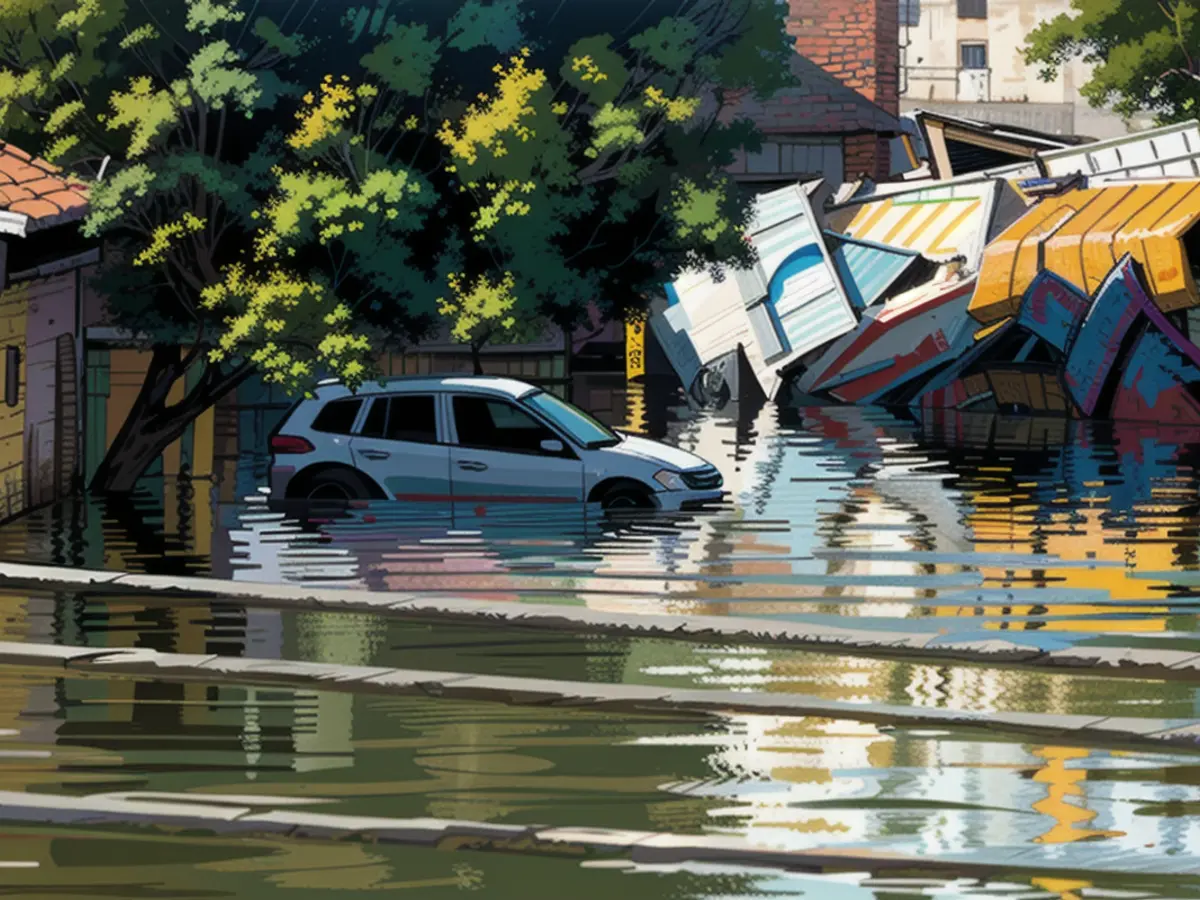Brazil registers more than 100 fatalities from floods.
Rio Grande do Sul is submerged in an ocean of water as heavy rain continues to fall. Over 400,000 individuals are forced to abandon their homes, preparing for a costly reconstruction process. Experts attribute this to a pattern of increasing frequency and severity of storms caused by climate change.
Following severe rainfall in the southern part of Brazil, residents are still struggling against the torrential downpours. Bulling in the region, large portions of land lie underwater and streets and houses are submerged. According to local authorities, at least 116 lives have been lost due to the storm.
"The consequences of the floods are catastrophic," penned Rio Grande do Sul's governor, Eduardo Leite, on platform X. His government estimates the rebuilding costs to reach over 19 billion reais, equivalent to 3.4 billion euros.
Brazilian President Luiz Inácio Lula da Silva announced an extensive aid package for the region worth billions. "We must not let bureaucracy hinder us from helping those in Rio Grande do Sul," he expressed on platform X. Pope Francis pledged 100,000 euros in emergency aid for the flood victims, reported by the Brazilian Bishops' Conference.
The civil defense reports 756 people hurt and 143 more still unaccounted for. 1.9 million people in 437 towns throughout the region have been affected by the flooding. Over 400,000 residents evacuated their homes and took refuge with relatives or in emergency shelters.
Numerous communities impacted by the floods experienced a cutoff from their utilities. Electricity, water, phone, and internet connections were disrupted in several locations. The air force stepped in, delivering medical aid, water treatment plants and provisions.
The United Nations Refugee Agency plans to distribute tents, field kitchens, rechargeable lamps, and hygiene products for the refugees and migrants fleeing the disastrous floods. Around 41,000 refugees and migrants from Venezuela and Haiti are also living in the affected region.
Disaster relief group Caritas also deployed to the flood zone, delivering essentials like food, water, clothing, and hygienic products. "Food and clean water are essential now, as people's possessions are submerged and they now have nothing left," stated Manuel Brettschneider from Caritas Germany. "There hasn't been something like this in more than 80 years. It's not an exaggeration to call this a flood of the century."
Canosexperienced the brunt of the storm's fury. "The city was ravaged. We lost 19 out of 27 healthcare centers. Four of the five district pharmacies were destroyed," said Mayor Jairo Jorge on Globo TV. "All the schools have been damaged; we've lost infrastructure and sports centers and must rebuild everything."
Thousands of firefighters and disaster relief experts were mobilized to combat the floods. On Thursday, in Canoas, they rescued a horse that had taken refuge on the roof of a house. It was sedated and safely transported off the rooftop using a lifeboat, captured on live television. The emergency services had safely evacuated over 70,000 citizens and nearly 1,000 animals.
Inmet, the Brazilian weather service, projected more heavy rainfall for the area until Sunday. The Civil Defense of Rio Grande do Sul issued a warning of heavy rain and strong winds over 90 kilometers per hour for a large part of the state. There was also a potential for thunderstorms and hail.
Climate experts, such as meteorologist Carlos Nobre, stated that Rio Grande do Sul's excessive rainfall had shattered all previous records. "The data reveals that as much rain has fallen in the state in less than two weeks as had fallen in five months prior. A new cold front is forecast with even more rain," he informed the state news agency Agência Brasil. "Although there won't be as much rain as last week, river levels will remain high, and those in low-lying areas will continue to struggle with flooding."
Brazil has suffered several extreme climate events recently. For instance, the usually wet Amazon was gripped by an unprecedented drought and scorching heat last year. The area's rivers dried up, and many animals perished.
Though extreme weather events like the floods in southern Brazil occur naturally, climate change is a primary contributing factor to these occurrences becoming more numerous and more intense. "Climate change due to greenhouse gases we release into the atmosphere is the cause behind the rising frequency and intensity of extreme events," declared Nobre.
"We must not forget the essential role we play in mitigating climate change, lest we find ourselves battling its ravages more often and with increasing severity in the future." The Governor advocated for action to abate global warming.
Read also:
- Floods: water levels remain critical in many places
- Snow chaos further restricts Bavaria
- Continuous operation in the flood areas
- Flood situation remains tense in many places
- Pope Francis, in response to the flood-related devastation in Brazil, pledged 100,000 euros in emergency aid for the affected individuals, as reported by the Brazilian Bishops' Conference.
- The United Nations Refugee Agency (UNHCR) plans to distribute necessary items like tents, field kitchens, rechargeable lamps, and hygiene products to the refugees and migrants who were displaced due to the floods in Brazil.
- Climate change expert Carlos Nobre acknowledged that the excessive rainfall in Rio Grande do Sul had broken all previous records, attributing this to the rising frequency and intensity of extreme weather events, largely due to climate change.
- Brazil's former President Luiz Inácio Lula da Silva expressed his concern about the climate-change-related environmental disasters, emphasizing the importance of global warming mitigation efforts to avoid such calamities from becoming more frequent and severe in the future.
Source: www.ntv.de






